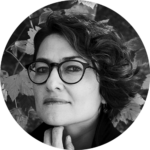Gülbin Özdamar Akarçay
Quick links: Introduction / Categories / Rules / Judges / Moderators / Coordinators / Awards / Sponsors / Key Dates / Who Can Participate? / How to Participate? / Archives / FAQs

She was a newlywed when they had to escape from Afghanistan. She could only take the pillowcases from her dowry with her. She lost them on the smuggled roads. She started crying. She told the smugglers that she would not walk unless they found her pillowcases. After spending a night in the animal barn, the smugglers found them and brought them to her. Those pillowcases, in front of which he posed, now stand in the living room of the house he built as a refugee. (2023- From the woman has no name series)
Born in 1980, Gülbin Özdamar Akarçay received her B.A., M.Sc., and PhD in Journalism from Anadolu University in Turkey. She is a documentary photographer, researcher, and curator who tries to understand the cultural, ideological, environmental, and sociological order of the world, as well as the ordinary structures of daily life. Also an academic, she produces documentary and uses photography to conduct visual ethnographic research and produce photographic installations that are highly conceptual. Many of the photo-essays, installations, and social projects she has launched concern social issues: projects protesting violence against children and women, migration, identity; installations about cultural diversity, gender, mindset, and the environment. Her recent project involves working with refugee women and sugar factory workers in Turkey. She was the curator of “Intimate Revolt” exhibition which was supported by FAMU in Prague. “Intimate Revolt” exhibited in several countries such as Czech Republic, Slovenia, Lithuania, and Turkey. She was also the driving force behind the Living Woman Photography Group, which advocates for women and children who are victims of violence. The group’s projects resulted in photography exhibitions between 2011-2022. Apart from promoting the works of others, she has held many personal exhibitions which include “Face of Prisoners” (2002), “Children of Maticni” and “Narodni Divadlo” (2007), “My Self reflexive Diary: The Balkans” (2017) and “Don’t look at me like that” (2023). She was a post-doc fellow at Department of Anthropology in University of Toronto Scarborough and was selected for the World Press Photo seminar organized in Turkey in 2002-2004.
Categories judged by Gülbin: Spot News / Portraits / General News / Portrait Series / Cultural Practices / Photographer of the Year, Asia
Quick links to POY Asia 2024 Judges: Gülbin Özdamar Akarçay / Lam Chun Tung / Forough Alaei / Wan Chantavilasvong / Joshua Irwandi / Jessica Lim / Saiyna Bashir / Steven Lee / Yuki Tanaka / Shuchi Kapoor

Opera singer who draws attention with her costume waiting for the avant-garde opera show in Narodni Divadlo, Prague. (2006-2007- From Narodni Divadlo Series)
"I want photography to turn into my way of thinking and to narrate myself and my criticisms that I think I owe to this century through my lens. I like to emphasize that I respect my subjects in my work of art by producing modest and sincere attitude of self-reflexive documentary photography. In my photography, the subjects can easily look at my lens directly, mostly showing their pride in any circumstances. When you come across my photos, instead of feeling sorry for them, you rather try to develop empathy."
Gülbin Özdamar Akarçay

The Carnival series consists of photos I took at various times and events in Toronto’s Gay neighborhood. (2016-2017- From Mindset: Toronto series)

Abandoned places are the sanctuaries of those who seek the past. (2022- From Places series)


